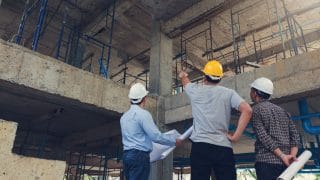
A construction estimator plays a critical role in the success of residential and commercial construction companies. It’s a collaborative job that helps construction firms create project bids and give accurate estimates to clients. It’s also a job in a stable industry that offers the flexibility of working on a team and becoming a leader over time.
What is a construction estimator?
A construction estimator is a construction management job. They usually work at a construction firm and analyze data to accurately estimate the cost of a project. Construction cost estimates include materials, equipment, and labor.
Construction estimators typically work in an office, but may visit construction sites as part of the job. Projects could include assessing buildings and infrastructure. Oftentimes, estimators work on a team. One person may focus on electrical estimates while other team members focus on plumbing and structural estimates.
Construction estimator salary
According to the U.S. Bureau of Labor Statistics, the median annual salary for an estimator is $66,610. Job growth is expected to be around 1% through 2030.
What does a construction estimator do?
Construction estimating involves either summarizing the total costs of a specific construction project or preparing an itemized list of costs for the project. Estimated costs could be used in a contract bid package or as part of the negotiation process with the owner. You must be able to understand the plans and specifications and translate those needs into a cost estimate. For example, a takeoff is a quantity survey of the various materials needed for the project. Most companies have a standard approach to organize the quantity takeoff using a specific protocol.
Construction estimating is a collaborative process. Expect to work with other construction industry professionals, such as architects, engineers, contractors, and the project owner. You may be asked to give recommendations on how to lower the bottom line. In addition to estimating project costs, you will likely also need to track the actual costs and compare them to your estimates.
The amount of time it takes to create a cost estimate depends on a number of factors. More experienced construction estimators could calculate costs in their heads and be fairly accurate. But complex projects that require detailed cost breakdowns could take more time, especially if you need to wait on supply estimates from vendors. Estimators should avoid underestimating a project, otherwise your company could end up with a loss.
Key tools
A variety of tools are available to construction estimators:
A construction estimator plays a critical role in the success of residential and commercial construction companies. It’s a collaborative job that helps construction firms create project bids and give accurate estimates to clients. It’s also a job in a stable industry that offers the flexibility of working on a team and becoming a leader over time.
What is a construction estimator?
A construction estimator is a construction management job. They usually work at a construction firm and analyze data to accurately estimate the cost of a project. Construction cost estimates include materials, equipment, and labor.
Construction estimators typically work in an office, but may visit construction sites as part of the job. Projects could include assessing buildings and infrastructure. Oftentimes, estimators work on a team. One person may focus on electrical estimates while other team members focus on plumbing and structural estimates.
Construction estimator salary
According to the U.S. Bureau of Labor Statistics, the median annual salary for an estimator is $66,610. Job growth is expected to be around 1% through 2030.
What does a construction estimator do?
Construction estimating involves either summarizing the total costs of a specific construction project or preparing an itemized list of costs for the project. Estimated costs could be used in a contract bid package or as part of the negotiation process with the owner. You must be able to understand the plans and specifications and translate those needs into a cost estimate. For example, a takeoff is a quantity survey of the various materials needed for the project. Most companies have a standard approach to organize the quantity takeoff using a specific protocol.
Construction estimating is a collaborative process. Expect to work with other construction industry professionals, such as architects, engineers, contractors, and the project owner. You may be asked to give recommendations on how to lower the bottom line. In addition to estimating project costs, you will likely also need to track the actual costs and compare them to your estimates.
The amount of time it takes to create a cost estimate depends on a number of factors. More experienced construction estimators could calculate costs in their heads and be fairly accurate. But complex projects that require detailed cost breakdowns could take more time, especially if you need to wait on supply estimates from vendors. Estimators should avoid underestimating a project, otherwise your company could end up with a loss.
Key tools
A variety of tools are available to construction estimators:
- Project plans. Having the plans and specs in front of you lets you do some estimating manually, if preferred. You can capture dimensions and identify material quantities.
- Reference book. A hard copy of Walker’s Building Estimator’s Research Book, which is updated annually, gives you a sense of material costs to help with estimates.
- Estimation software. Software is also available. It could be as simple as a sheet that automatically calculates quantities and costs or cloud-based software shared by the team to help with project management.
Necessary skills for a construction estimator
There are a number of skills needed to create accurate construction estimates and thrive in the work environment.
- Understanding of construction plans and specs. These documents are the basis for creating an estimate. You should be able to interpret the project plans in order to estimate the true scope of costs.
- Basic math skills. Estimating involves math, even when you use software. Doing calculations in your head can be helpful when you’re out in the field at a project site.
- Research skills. You’ll need to be able to research all of the costs involved in a project, including materials, labor, and equipment. This involves identifying quality sources of information and interpreting the data you find.
- Detail-oriented approach. Estimating is a nuanced skill, from understanding specialty subcontractors to supply-chain issues. Attention to detail helps you track all of the major and minor costs, as well as what factors could impact those estimates.
- Tech savviness. Knowing your way around tech will help you use estimation software. It may not be required in a smaller firm, but is probably necessary at larger construction companies.
- Relationship building. It’s important to build relationships with subcontractors, particularly those in specialty trades. This gives you quick access to labor costs when you need them.
- Strong communication skills. A construction estimator is not a lonely job. You will likely work with many other people, even beyond your estimating team. You should be able to communicate the project scope and costs in a clear way so that the owner and everyone else on the project knows the bottom line.
How to become a construction estimator
There are two ways to become a construction estimator: gaining field experience in the construction industry or earning a bachelor’s degree. Here’s an overview of each process.
Bachelor’s degree
You typically need a bachelor’s degree to become a construction estimator, usually in construction or engineering. You may also receive training when you get started with a specific company. Most people start in an entry-level position as a member of an estimating team, then grow into a leadership role.
On-the-job experience
You may be able to bypass the degree requirement if you have years of experience in construction. If you’ve worked as a field engineer or project manager, you’ve likely gained relevant experience and know how costs work. You could then potentially move into the estimating side rather than working on-site.
Becoming a construction estimator can be an extremely rewarding job, especially for someone who enjoys data analysis in a collaborative work environment. And because there are multiple paths to becoming an estimator, anyone who is passionate about this job can find a way to succeed.
MT Copeland offers video-based online classes that give you a foundation in construction fundamentals with real-world applications, like how to prepare a construction estimate. Classes include professionally produced videos taught by practicing craftspeople, and supplementary downloads like quizzes, blueprints, and other materials to help you master the skills.







